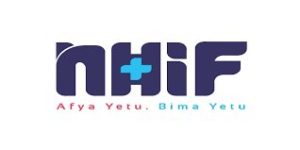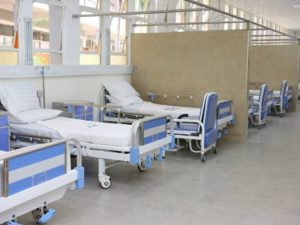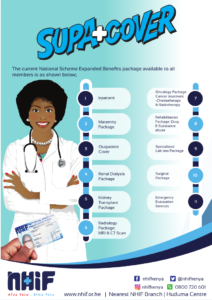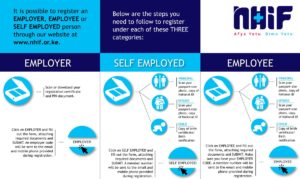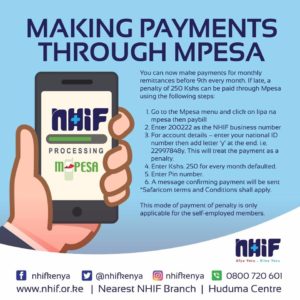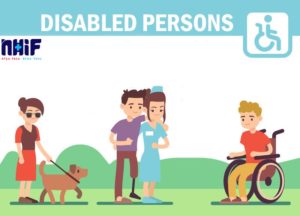Kenya has one of the most costly medical industries in Africa. To make matters worse, healthcare costs continue to balloon and unless you have taken precautions like regularly making your nhif payment, you either fervently pray and hope for good health or ensure you have a good alternative to nhif outpatient cover.
Indeed, considering the rate at which scary ailments like cancer continue to savagely attack Kenyans, living without medical insurance could be too risky.
To put things in perspective, the numbers look grim. It has been reported that there are over 40000 new cancer cases annually while 10% of Kenyan urban men are at a serious risk of suffering heart disease.
On the same alarming note, over 10,000 Kenyans need dialysis as a result of kidney problems.
Even without mentioning Aids and the complications it can bring, this clearly shows that you need to register for services at nhif hospitals (or hospitals accredited by your preferred insurance provider).
Anyway, this article is all about nhif payment and various nhif benefits so let’s get down into business.
What is NHIF?
NHIF (National Hospital Insurance Fund) is a government of Kenya run medical insurance scheme open to all Kenyans.
It covers basically everyone – employed and self-employed and the best thing about NHIF is that the monthly rates are quite affordable(more later).
In recent years, the government has been pushing Kenyans to adopt NHIF by expanding its coverage to include even our grandparents, recruiting more hospitals into the program, and bringing NHIF registration services online via the www.nhif.or.ke pay online portal and nhif hospital login (for hospitals).
image credit: NHIF
Advantages of joining NHIF (benefits from nhif)
- The fund covers both inpatient and outpatient services in its many accredited services. This is nt always the case with private medical insurance schemes.
- The charges are quite affordable. If you are self-employed, you need just to pay Kshs.500.00 monthly to qualify. The rates for civil servants and officially employed citizens vary based on the salary but remain comparatively low than the amounts charged by a number of private providers.
- You can access a variety of healthcare services including maternity (caesarian operation inclusive )from the over 5000 nhif accredited outpatient hospitals and nhif inpatient hospitals through nhif maternity cover in private hospitals (and almost all public hospitals).
- They most always pay for your charges provided your subscriptions are up-to-date and that your details are accurate.
- They cover even expensive treatments like dialysis and medical obtained in foreign hospitals (India included).
- NHIF pays a significant amount of money. In fact, for maternity and most outpatient services (in public facilities), it will pay everything.
- NHIF caters for Kenyans with various disabilities.
- There is no age limit of coverage or registration.
- Unlike most of the competitors, there’s no pre-screening or such tests before being accepted for membership so you can’t be refused membership!
- The fund can cover an unlimited number of dependants.
What NHIF Covers
The other great thing about NHIF is that they have a plethora of covers and will help reduce the financial burden when you or loved ones do down with sickness..
Here’s a summary of what nhif beneficiaries get:
- Outpatient services.
- Inpatient services.
- Maternal care.
- Reproductive health services (family planning).
- Radiology imaging services.
- Drug and substance abuse rehabilation services.
- All surgeries including kidney transplant and heart operations.
- Emergency road evacuation (ambulance services).
- Cancer treatment.
- Renal dialysis.
- Overseas treatments.
Now let’s look at some of their specific covers;
-
linda mama nhif cover
This seeks to cushion families against astronomical maternity and infant medicare bills.
Once registered, and mark you registration is free (you are exempted even from the usual 500/- minimum), the mother and her child benefits for 1 year from free pre-natal and post-natal care in various medical centers.
To be eligible, visit the nearest nhif branches in nairobi and upcountry and register as soon as you learn that you’re expectant.
Who qualifies for linda mama nhif cover?
All kenyan pregnant women qualify for the free maternal services in various maternity hospitals in nairobi and the whole country.
Where can I register for Linda mama?
- Mobile phone . Dial *263# and follow the steps
- Visit the NHIF registration portal and follow the steps
- From NHIF officially Contracted Health care hospitals (ask your hospital for guidance)
- All NHIF service centres
- Huduma centres countrywide
Registration requirements:
- Pregnant women must be aged at least 18 years should present their national ID card and Antenatal care card.
- Pregnant women under 18 should present their guardians’ national ID card and Antenatal care card/booklet.
- Pregnant women without an ID card or an ID card from a guardian should use their Antenatal care records
- A membership card (with your FMS number)is issued as soon as the registration goes through.
How to Register for Linda mama on your mobile:
- Press *263* then the call button. (Ensure you have enough airtime on your mobile before- at least 10/- )
- Now you need to choose a language (English/Kiswahili). Type 1 to proceed in English or 2 if you prefer Kiswahili and send.
- You are taken to NHIF mobile services platform. Enter 1 (registration) then send.
- Now you need to select the scheme which is free maternity so type 2 and again send.
- Next, select an identity type Kenyan ID, passport, or an alien ID. Press 1 and send to register using your national ID card.
- Next enter the ID number and send.
- Now type in your first name then send.
- Now type in your last name then send.
That’s all. You will receive an SMS confirming your registration for linda jamii and your application number. From there, you should contact your preferred health center to confirm the cover so don’t delete the SMS.
What Linda Mama pays for:
- Antenatal care
- Neo Natal care (delivery) in contracted facilities.
- Various Conditions and complications as they may arise during pregnancy
- Outpatient services for the infant
Where to access Linda mama care Services:
All contracted NHIF public, private and even faith based hospitals.
-
Civil Servant Scheme
Civil servants access various benefits through an established capitation model:
- Inpatient cover
- Outpatient cover
- Maternity cover
- Reproductive health services
- Ex gratia payments (up to fixed limits)
- Group life cover including death cover
- Last life expenses (covering funeral expenses)
-
Edu Afya cover
SECO AFYA covers medical expenses for in public secondary schools.
NHIF officials conduct Biometric registration at the respective secondary schools so you don’t have to worry. However, to qualify, a student must be registered on NEMIS.
The cover is expected to ease the burden that parents with students in high schools face when there are admitted since it practically covers almost everything including emergency air ambulance/rescue.
image credit: NHIF
4. NHIF SUPA cover
nhif supercover is no doubt Kenya’s largest medical cover. Through it, you and your family enjoy unparalleled medical benefits from surgery to simple flu treatment.
When talking about NHIF, most people register for the supa cover and it’s what you should register for if you are not yet covered.
How Much does Super Cover Cost?
While there are some nhif cover limits on inpatient care (especially for high-end hospitals), nhif super cover rates for self-employed people remain Kshs. 500 each month. This amount is enough to cater for you and all your beneficiaries in all nhif supercover hospitals!
As I had mentioned, the rates differ depending on the job group for civil servants and the formally employed.
nhif supa cover benefits Kenya:
- Outpatient services – medical consultation, lab tests, daycare processes, in-depth investigations, drugs and dispensation, wellness and counselling, physiotherapy, health education, and immunization/ vaccines
- Inpatient services
- Maternal care (Normal and caesarian section)
- Family Planning
- Renal Dialysis
- specialized surgeries even those not available locally
- Rehabilitation for substance and drugs abuse
- All surgical procedures
- Emergency road evacuation services
- Radiology imaging (X-rays, MRI, and CT Scan)
- Cancer Treatment
- Sexually transmitted diseases (STDs)
NHIF SUPA cover requirements
So, what are the nhif super cover requirements before registration?
- Be aged 18 years and above. There’s no maximum age limit.
- Total minimum monthly income for self-employment is Kshs. 1,000
- You must drawing your income from Kenya.
- You can also apply if working under contract or casual employment terms (liaise with your employer).
- Foreign visitors working legally or studying in Kenya can also apply.
Which documents must you provide:
- Copy of your National I.D (including your spouse if applicable)
- Copy of an Appointment/Introduction Letter from your employer for those employed.
- Colored passport photo (include that of your spouse and dependants if applicable).
- Original birth certificate(s) and copies for your dependants.
image credit: NHIF
nhif super cover registration
For those in formal employment, your employer must be registered before you can enroll. Employers can register by filling in the relevant nhif forms either online or submitting them to the nearest NHIF office.
Other relevant nhif forms such as nhif form 8b are here..
Here is how to register for this cover NHIF online(self-employed individuals):
Step 1: Visit the nhif super cover scheme registration website here.
Step 2: Click the self-employed tab.
Step 3: Enter all the details in the provided form. You must be careful and accurate (it won’t proceed if your ID is incorrect). You must have scanned your national ID card, and a good quality passport size photograph. Include your scanned copies of your spouse’s ID and birth certificates (you can get assistance from a nearby cybercafé).
Step 4: Once done, click to save the details at the bottom.
If you filling everything correctly, you will soon get a notification from the NHIF website via SMS alerting you of the application status.
If advised to pay, proceed to submit your first NHIF payment via mpesa (see steps below).
Alternative: register from your phone.
- Press *263* then the call button. (Ensure you have enough airtime on your mobile before- at least 10/- )
- Now you need to choose a language (English/Kiswahili). Type 1 to proceed in English or 2 if you prefer Kiswahili and send.
- You are taken to NHIF mobile services platform. Enter 1 (NHIF registration) then send.
- Now you need to select the scheme which is national so type 1 and again send.
- Next, select an identity type Kenyan ID, passport, or an alien ID. Press 1 and send to register using your national ID card.
- Next enter the ID number and send.
- Now type in your first name then send.
- Now type in your last name then send.
That’s all. You will receive an SMS confirming your registration for NHIF super cover and your application number. From there, you should contact your nearby NHIF branch office to confirm your status.
Alternative: register for NHIF services from the M+kava app.
Steps:
- Download the app here
- As soon as the app installs, open it and then your details as prompted.
- The app keeps you informed about the status of your application and payments in real time.
image credit: NHIF
Making nhif payment via MPESA
Ensure you have enough funds in your mpesa to cater even for sending charges.
Here are the steps to make your nhif payment:
- Go to your MPESA kit on your phone
- Select lipa na MPESA then Pay Bill
- Enter NHIF’s Business no.200222
- The account number is your national ID so enter it.
- Enter the applicable amount (shs.500).
- Enter your pin then confirm the details.
- You will get another confirmation SMS from NHIF.
Formal sector employees’ monies are deducted and sent to the NHIF by their employers.
Members in the informal sector should ensure they make their nhif payment pay before 9th of every month to avoid penalties. Again, if your payments aren’t updated, you won’t access services so it’s in your own best interest that you pay up.
If possible, you can send the lump sum kshs.6000 nhif payment annually every January. It will give you peace of mind for the rest of the year.
Alternatively, you can be saving kshs. 17 daily on your mpesa/mshwari. You will have the required 500/- by end month. Always check your nhif supercover payment status by dialing *263# or requesting for your nhif statement via their official email.
Choosing an Outpatient Hospital:
NHIF requires that you select an outpatient facility to be getting assistance in paying for bills incurred in outpatient facilities.
So, immediately once you register, choose your preferred hospital.
Steps:
1. Download the outpatient choice facility.
2. Complete the form appropriately and visit the nearest NHIF branch.
Requirements:
- Confirm that your favorite medical center is in the nhif hospitals list
- Carry a copy of your National ID.
You can also scan the duly completed form and email it to info@nhif.or.ke together with the ID copy.
Changing an Outpatient Hospital:
If for some reason you would like to shift to another healthcare facility, NHIF requires that you submit a
change hospital nhif form to them to have the changes effected.
Steps:
1. Download the change of outpatient facility form.
2. Complete the form and visit the nearest NHIF branch
Remember to state the reasons behind your changing the outpatient hospital.
image credit: NHIF
Checking Your NHIF Account Status via SMS:
To know your account status through your mobile phone:
- Write a new sms as follows:
Type “ID”, then space then your national ID number
e.g ID 12345678
- Send this SMS to 21101
Note: The SMS cost Kshs 10.
How long does nhif card take to be active?
The card matures (and mare) matures in 2 months but the ministry has pledged to look into ways of shortening the waiting duration to enable members access the services perhaps within 30 days of enrollment.
To Access NHIF services in Any Accredited hospital:
Most facilities in the nhif list of hospitals will request that you submit your NHIF details and ID card as soon as you are admitted to allow them verify your details. Once they have confirmed that everything is ok, yours will only be to enjoy the best care.
When clearing, you may be asked for your NHIF number again. In cases where the NHIF rebate isn’t enough for the services availed to you, the hospital will usually ask you to top up the deficit in cash or using your other medical insurance.
What if You are Already Registered but want to Add your Spouse or children to the NHIF card?
Once you get a new baby (or wife), you can add dependants to your cover without incurring additional charges.
Here is how to add beneficiaries to nhif:
The best way is to visit your closest NHIF branch office or huduma centre (NHIF desk)
The Documents you will Need.
- Copy of your National ID
- Copy of your wife’s ID
- A clear photocopy of your original marriage certificate. You can swear an affidavit in a local magistrates’ court to the effect that he/she is a spouse and carry it’s copy. By the carry an original of the marriage documents to be on the safe side.
- For your children, a photocopy of the birth certificate or birth notification for toddlers below 6 months.
- Colored passport size photos for all the dependants to be added.
image credit: NHIF
Alternatively:
- Download and Fill out the official NHIF amendments form number 26.
- Be sure to fill everything correctly.
- Attach the asked for copies of all the documents I have mentioned above.
- Hand over these documents to the NHIF office.
- The additions should be activated as soon as your NHIF officer has entered them into the system.
nhif contacts
Toll free number: 0800 720 601
Other Phone Contacts:
(020) 272 3246, (020) 272 3290, (020) 2723255 or (020) 272 3281/2.
Head office: Upper Hill, on Ragati road (Haile Selassie junction) Nairobi Opposite National Library headquarters
NHIF website: http://www.nhif.or.ke
Clients email: info@nhif.or.ke or customercare@nhif.or.ke
Complaints email: complaints@nhif.or.ke
Liaison email: info@nhif.or.ke
To report Fraud: fraud@nhif.or.ke or call (020) 271 4803
Fax number: (020) 271 4806

